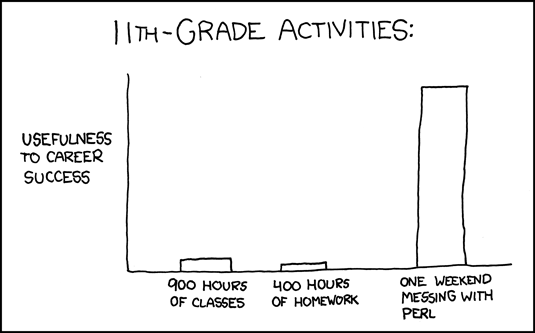I've come across a very interesting personality characterization method
today. It is called the Myers-Briggs Type Indicator and attempts to categorize your personality according to four factors: social attitude (
Extraversion /
Intraversion), perceiving functions (
Sensing / I
ntuition), judging functions (
Thinking /
Feeling) and lifestyle preferences (
Judgment /
Perception).

Social attitude describes the way you interact with others: either openly or shyly (very generally spoken, as will be the case for all other factors). Perceiving functions are the way you process information: either by trusting unfiltered, tangible data collected by your senses or by abstractly analyzing what happens around you. Judging functions delineate how you evaluate gathered information: either by comparing them to general concepts in your mind or by weighing them with situational environments and events. Lifestyle preferences characterize which set of abilities, perceiving or judging, you like to use and to show to others.
You can take a personality test based on this model
here. To find out what your results could translate into in real-life, look
here. Wikipedia has a section on the
frequency of all 16 Myers-Briggs personality groups within the United States population.
I decided to give it a shot and my result was
INTJ - Introverted Intuitive Thinking Judging. I found astonishing similarities between the type decription on personalitypage.com and my own perception of myself:
The INTJ's interest in dealing with the world is to make decisions, express judgments, and put everything that they encounter into an understandable and rational system. Consequently, they are quick to express judgments. Often they have very evolved intuitions, and are convinced that they are right about things.
They dislike messiness and inefficiency, and anything that is muddled or unclear. They value clarity and efficiency, and will put enormous amounts of energy and time into consolidating their insights into structured patterns.
INTJs need to remember to express themselves sufficiently, so as to avoid difficulties with people misunderstandings. In the absence of properly developing their communication abilities, they may become abrupt and short with people, and isolationists.
Interestingly, I see a similar behavioral pattern on libertarian message boards quite a lot. The majority of users demand
rigorous intellectual honesty in debates and get annoyed and angry fairly easily once a counterpart seems to be avoiding this duty. You'll encounter long-lasting debates on
details of a philosophy in which users with adverse views will valiantly defend their own position over many pages, even if it's just a minor detail among details - logic and stringency are to be preserved. And of course, there'll be countless debates about semantics for the purpose of being right because one feels right. I expect this to be more generally the case among those with a contrarian point of view or a very specific research interest. I wouldn't be surprised if a good number of professed and philosophically sound libertarians scored somewhere around INTJ.
Another intriguing aspect are attitudes towards morality, duty and authority among the more common personality types (INTJ is the third rarest personality, according to Wikipedia). For example, take a look at
ISFJ, the most widespread character type:
They value security and kindness, and respect traditions and laws. They tend to believe that existing systems are there because they work.
The ISFJ has a difficult time saying "no" when asked to do something, and may become over-burdened. In such cases, the ISFJ does not usually express their difficulties to others, because they intensely dislike conflict, and because they tend to place other people's needs over their own.
ISFJs need positive feedback from others. In the absence of positive feedback, or in the face of criticism, the ISFJ gets discouraged, and may even become depressed.
In other words, ISFJ types fit best into a highly regulating statist society. They have faith in existing institutions, they do not tend to question the good motive of those working within them, they will not complain too much about overbearing taxation or presumptuous legislation (they can't say no!) and they're unlikely to adopt unpopular (anti-state) views because they need positive feedback from others - who are probably going to be pro-state in a statist society. That doesn't mean this personality type is somehow "bad" - only that it can easily be abused in a statist environment when there's no consciousness for the potential of abuse among ISFJers.
The second most common personality type is
ESFJ. ESFJers are closely related to ISFJ persons, they just tend to be a little bit more outspoken. See what's prevalent among them:
They need approval from others to feel good about themselves. They are hurt by indifference and don't understand unkindness. They are very giving people, who get a lot of their personal satisfaction from the happiness of others. They want to be appreciated for who they are, and what they give.
They may have a strong moral code, but it is defined by the community that they live in, rather than by any strongly felt internal values.
In such cases, the ESFJ most often genuinely believes in the integrity of their skewed value system. They have no internal understanding of values to set them straight. In weighing their values against our society, they find plenty of support for whatever moral transgression they wish to justify. This type of ESFJ is a dangerous person indeed.
ESFJs respect and believe in the laws and rules of authority, and believe that others should do so as well.
ESFJ types seem to be prone to all kinds of indoctrination. If a person holding a high public office tried to explain to me that printing money equals generating wealth, I'd most likely call shenanigans. ESFJ types might reconsider their own position instead of questioning the view of public authority. Given state power, they may also be more reckless in using it since they tend to lack a correction mechanism for bad ethical standards. Plus, they believe in existing institutions as well, making them wary of any revolutionary thought. Basically, they seem to be the more active counterpart to the ISFJ type.
Finally, let's examine
ISTJ personalities, the third most common type of person:
They are "good citizens" who can be depended on to do the right thing for their families and communities.
ISTJs tend to believe in laws and traditions, and expect the same from others. They're not comfortable with breaking laws or going against the rules. If they are able to see a good reason for stepping outside of the established mode of doing things, the ISTJ will support that effort. However, ISTJs more often tend to believe that things should be done according to procedures and plans. If an ISTJ has not developed their Intuitive side sufficiently, they may become overly obsessed with structure, and insist on doing everything "by the book".
Another kind of person that can be horribly abused under the wrong kind of guidance. Again, I'd like to point out that there's no intrinsically "bad" or "weak" element in these personalities; however, understanding that about one third of the US population shares a common inclination towards manipulation by "society" might help us see through some of the mechanisms that exist around us and whose function we understand on a theoretical level, but can't comprehend practically. How is it that obvious contradictions in state theory are often ignored? Why do so many people seem to blindly follow authority? This might give us some hints.
It may also explain why libertarians had only limited success in communicating their ideas despite an unmatched theoretical framework. Many people just don't seem to be into abstract cloud-castles even if they appear superior to currently existing systems and institutions. Understanding the personality of our target group should help to adapt our strategies.
There's a lot more to it, but I'll leave it at that. However, I strongly encourage you to research this topic. It sure caught my attention once I got the fundamentals.

















